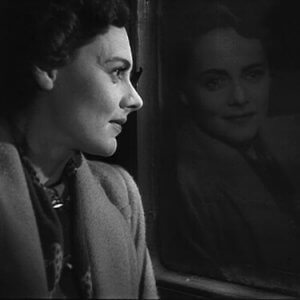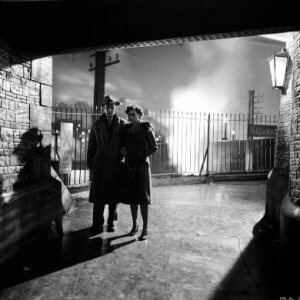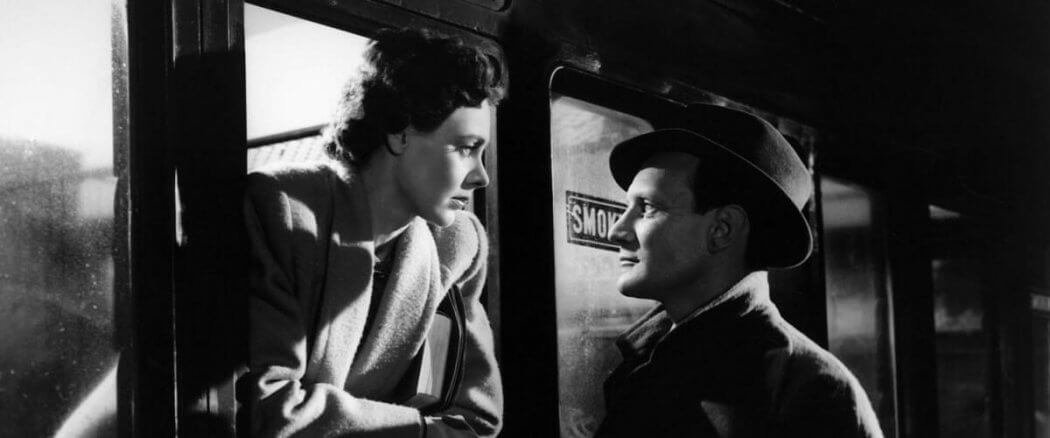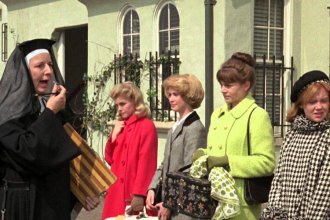The first film review I ever wrote was of Brief Encounter, for a Wisconsin Lutheran college newspaper. The review is, mercifully, lost to us, and so I find myself writing another, having seen and lived a lot more in the time between. Yet even now, as then, if someone asks what my favorite film is, Brief Encounter is the instinctive reply; but it was only recently, while researching for this review, that I learned why.
I was in the library, eavesdropping on a couple of employees flirting with one another, when I read this: “Brief Encounter is not often listed among the noirs, but it is a film about traps, feeling guilty, and being imprisoned against your nature.”* As a young gay man in a Wisconsin Lutheran college, I knew about being imprisoned against your nature. But there is knowing and knowing. Which is how we got in this human condition.
Nice-looking
Based on the short play Still Life by Noel Coward and directed by David Lean, Brief Encounter is the final of their four film collaborations. Through this partnership, Lean became an author’s adaptor, faithful to the essence of the text and faithful to the essence of film. It’s exactly how he and his co-writers approached Still Life, altering the order of scenes and the ending, adding narration and characters, assembling a film whose influence ranges from Pinter’s Betrayal to Allen’s The Purple Rose of Cairo. Ultimately, the story is still about the life of a relationship.
 Mrs. Laura Jesson (Celia Johnson) is an “awfully nice” woman who, “on an ordinary day, in the most ordinary place in the world” — a railway station — gets some grit in her eye and, upon asking for water at the refreshment stand, is assisted by a “nice-looking” man within earshot, Dr. Alec Harvey (Trevor Howard). He removes the grit and she is grateful. “That’s how it all began,” Laura narrates.
Mrs. Laura Jesson (Celia Johnson) is an “awfully nice” woman who, “on an ordinary day, in the most ordinary place in the world” — a railway station — gets some grit in her eye and, upon asking for water at the refreshment stand, is assisted by a “nice-looking” man within earshot, Dr. Alec Harvey (Trevor Howard). He removes the grit and she is grateful. “That’s how it all began,” Laura narrates.
Some modern viewers may question what the “it” is, even as they are captivated, but more on that later. The film “puts us inside a female character’s psyche, [and] it also keeps a good pace doing it,” Bruce Eder remarks in the Criterion commentary, “not even slowing down for histrionics.” There are no histrionics. Both Celia Johnson and Trevor Howard are so understated that many contemporary performances seem overdone by comparison. And whatever your school of acting, Johnson will school you. “She looks quite ordinary,” writes Roger Manvell, “until it is time for her to look like what she feels.”
This Can’t Last
A week after it all begins, Laura and Alec run into each other on the street and exchange some pleasantries. A week after that, she is eating lunch at a crowded restaurant and he walks in. She invites him to join her. The two discuss their Thursday routines, which, for Laura, includes a matinee. “Would you mind, very much, if I came to the pictures with you?” Alec asks, adding, “I could sit downstairs, you could sit upstairs.” Laura smiles, “Upstairs is too expensive.” So they sit together, two spouses married to others, in the darkness. They will need more than an usherette to find the way out.
Once, in a letter, Dorothy Day counseled a married friend to end an affair, which she described as “a beautiful relationship . . . a once-in-a-lifetime relationship…Don’t think I don’t feel for you, and know the agony you are going through.” Brief Encounter is the same gorgeous and gorging agony; a dark and carbonated beverage that can swell to full and leave an emptiness. It’s also truthful, in the way few films are, about sin’s tingling alertness, the addictive quality that seems to be life, but is only death with an excellent mortician. “This can’t last…” Laura narrates like the teacher in Ecclesiastes. “Nothing lasts really. Neither happiness nor despair. Not even life lasts very long.”
 As if in agreement, clouds of smoke glide through the film, from cigarettes, breath in cold air, and, most importantly, the exhaust of trains, which rush in and out of the station, over and over. That’s not visual innuendo, as in Hitchcock’s North by Northwest; these two lovers are not the consummating kind. Or at least, censors didn’t allow them to be.
As if in agreement, clouds of smoke glide through the film, from cigarettes, breath in cold air, and, most importantly, the exhaust of trains, which rush in and out of the station, over and over. That’s not visual innuendo, as in Hitchcock’s North by Northwest; these two lovers are not the consummating kind. Or at least, censors didn’t allow them to be.
In our era, when everyone is on trial but no one is permitted to judge, to be contemptuous of censorship is both natural and hypocritical. In actuality, censorship was also a discipline, to which filmmakers responded — sometimes artfully, sometimes awkwardly — thereby transfiguring the truth as often as they disfigured it. And so while there may appear to no love scenes in Brief Encounter, there are. And they didn’t need to be censored.
Life at the Movies
On her way home on the train, after their nicest Thursday, [Laura] gazes at the night through the window and sees idyllic visions: the two of them dancing beneath chandeliers; at the Paris Opera; in a gondola on the Grand Canal in Venice; in a sports car traveling against a back projection; on the deck of an ocean liner in the moonlight, watching the ocean pass by, and on a desert island beneath palm trees. These are an anthology of life at the movies, and we feel that that entertainment is Laura’s key point of reference in thoughts of “love.”
It is a foregone conclusion, upon reading the above scene description by David Thomson, and some details of David Lean’s upbringing, that Laura was not the only one with movies as a key point of reference. Lean’s family consisted of “devout Quakers who regarded the cinema as inherently sinful and forbade him to attend film shows,”** but once Lean graduated, the family’s forbidding would not do, and every night he boarded the train for the West End cinemas, to find release in the latest. “The London suburbs…were very dreary, very grey,” Lean recounts, “and the movies were a journey into another world.”
Desire for Goodness
With Brief Encounter, Coward, Lean and company created another world, even for 1940s British filmgoers: it was “the vanguard of films representing the new post-war realism.”*** And yet it was a familiar world for Lean — suburbs, trains, marriage, infidelity — and none of it very good, or rather not as good as the appetite for goodness. “What [Brief Encounter] seems to say is,” Thomson writes, “go to the movies, have your frictionless fling, and then get on with the benefits of a domestic stalemate.”
With respect to Thomson, that doesn’t sound quite right — or maybe I just want to believe in something better. Maybe I want to believe that Lean understood the romance of unfaithfulness was an ephemeral plant. Better to not go in that garden. Just go to the movies.
__________________________________________
*David Thomson, The Big Screen: The Story of the Movies.
**Bruce Eder, in his commentary for the Criterion Collection release of Brief Encounter.
***Gene D. Phillips, Beyond the Epic: The Life and Films of David Lean.




